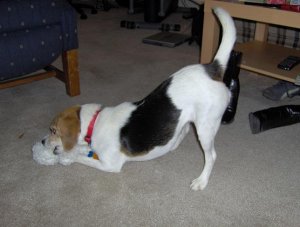Sabine
Ideal_Rock
- Joined
- Aug 16, 2007
- Messages
- 3,445
Help! My dog is acting out, and I don''t know what to do. Last night she started getting sick, which as I''ve posted before is pretty normal for her. I took her outside to let her eat grass, brought her back in, gave her the pills we have from the vet for just such an occassion, and took her back to bed. She slept through the rest of the night. When I got up this morning, I got in the shower like normal and left her sleeping on my bed (yes, she always sleeps on the bed with me). But when I got back in my room after showering, she had peed and pooped on the bedroom floor! She has never done this before!
And earlier this week, I got up to shower, and she got up with me. I could tell she wanted to go out right away, but I still thought she''d be fine, so I got in the shower anyway and let her out of my room to wander downstairs if she wanted. She left a puddle of pee downstairs, which she has done maybe twice before if she has seemed like she wanted to go out right away when I get up, so at least this occasion seems to have an explination.
Finally, I started video taping her recently because things haven''t smelled right when I get home. Turns out she has been peeing in her crate while I''m gone too. It dries by the time I get home, so I can''t always tell when she does it either...I"m so frustrated! We got her from a rescue network, and she was supposed to be crate trained, but since we''ve had her (over a year) she hasnt'' really gone into the crate much on her own. We have to put her in it when we leave, although she does lay right down and go to sleep. We''ve tried leaving her out of the crate while we''re gone, and she barks/howls the whole time we''re gone, so it seems like she likes the crate better, but doesn''t understand that she shouldn''t pee in it. The crate is big enough for her to pee and then still have room to lay down away from it. We''ve used a smaller crate before, and she would get so upset in it that she would eat her blanket and get hte runs and all other kinds of gross stuff, so now I''m really at a loss of what to do.
The only thing I can think of that would make her act out like this is that my FI is out of town and she misses him. Do you guys think that''s possible? He''s only OOT for one more week...do you think I should try to wait till things go back to normal before trying any behavior modification stuff?
Or do you guys have any other suggestions on how to get her to stop? TIA.
And earlier this week, I got up to shower, and she got up with me. I could tell she wanted to go out right away, but I still thought she''d be fine, so I got in the shower anyway and let her out of my room to wander downstairs if she wanted. She left a puddle of pee downstairs, which she has done maybe twice before if she has seemed like she wanted to go out right away when I get up, so at least this occasion seems to have an explination.
Finally, I started video taping her recently because things haven''t smelled right when I get home. Turns out she has been peeing in her crate while I''m gone too. It dries by the time I get home, so I can''t always tell when she does it either...I"m so frustrated! We got her from a rescue network, and she was supposed to be crate trained, but since we''ve had her (over a year) she hasnt'' really gone into the crate much on her own. We have to put her in it when we leave, although she does lay right down and go to sleep. We''ve tried leaving her out of the crate while we''re gone, and she barks/howls the whole time we''re gone, so it seems like she likes the crate better, but doesn''t understand that she shouldn''t pee in it. The crate is big enough for her to pee and then still have room to lay down away from it. We''ve used a smaller crate before, and she would get so upset in it that she would eat her blanket and get hte runs and all other kinds of gross stuff, so now I''m really at a loss of what to do.
The only thing I can think of that would make her act out like this is that my FI is out of town and she misses him. Do you guys think that''s possible? He''s only OOT for one more week...do you think I should try to wait till things go back to normal before trying any behavior modification stuff?
Or do you guys have any other suggestions on how to get her to stop? TIA.










300x240.png)